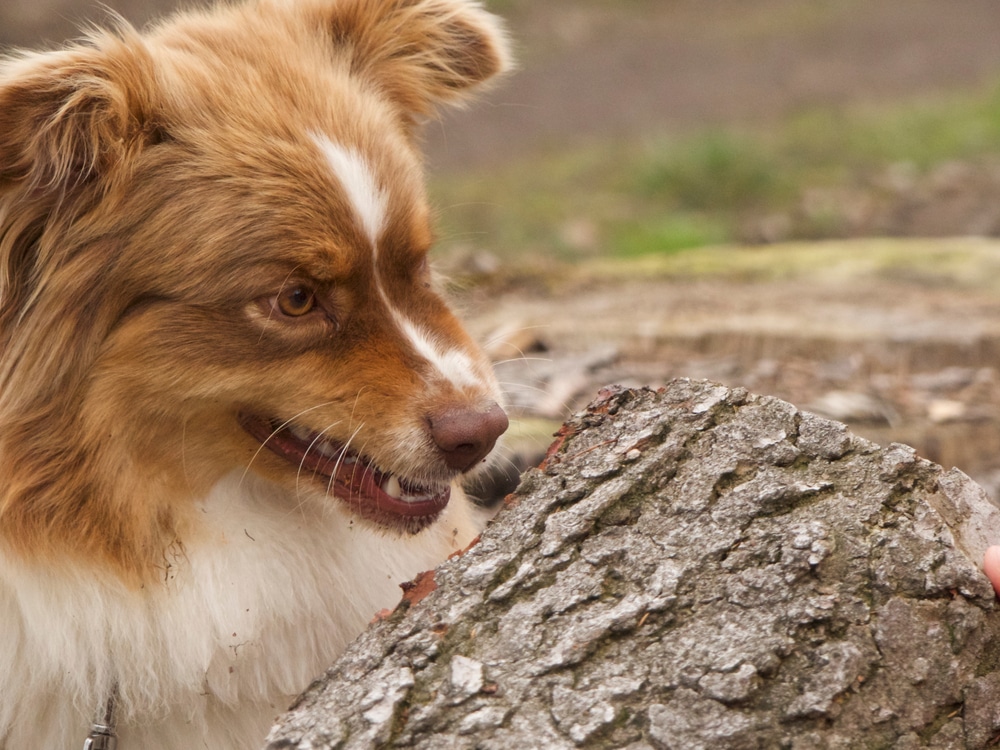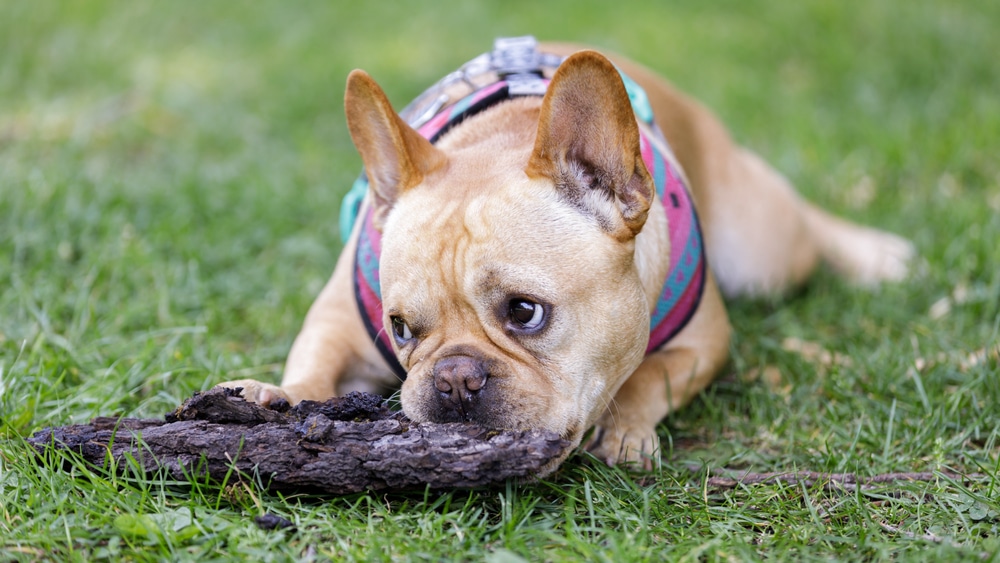Dogs are known for their curiosity. When they come across something new, they often want to investigate it. This is why it’s not surprising to find your dog gnawing on tree bark. The bark can be an interesting texture for them to explore, and some dogs may even find it tasty. But beyond their curiosity, what are other reasons your dog will eat tree bark?
Dogs eat bark for various reasons, including the desire for attention and affection, curiosity and exploration, chewing out of anxiety or stress, getting the taste or smell of the bark, and cravings for roughage and fiber. Eating bark may sometimes also be due to boredom, mimicking other animals, or even because it is a comfort to them. Teething puppies may also ingest bark for its nutrients, and some dogs simply enjoy the taste of tree bark. However, tree bark can cause gastrointestinal obstructions and blockages, can be toxic, can cause injuries to the mouth, can cause infections, and can cause potential nutritional deficiencies. If a dog is eating tree bark, consult with your veterinarian.
Table of Contents
10 Reasons Why Your Dog Eats Tree Bark
Tree bark may seem like an unusual snack for a dog, but for some dogs, chowing down on it is surprisingly common. So, there are several possible explanations for why your pup might be snacking on tree bark. Let’s dive in.
1. Desire For Attention And Affection
Dogs that eat tree bark may be trying to communicate they need more attention or affection from their owners. Eating tree bark is an attention-seeking behavior that can help your pup get noticed and receive the extra love and care they crave.
2. Curiosity And Exploration
The bark of trees can be an interesting and intriguing object for a curious canine. Dogs are natural explorers, and they may be drawn to the scent or texture of tree bark. Chewing on it can be a way for your pup to not only explore their environment but also relieve boredom or nervousness.
3. Chewing Out Of Anxiety Or Stress
Dogs may chew on wood, such as tree bark, out of anxiety or stress. This type of chewing often happens when a dog is left home alone for long periods of time or when they are dealing with other behavioral issues.
4. To Get The Taste Or Smell Of The Bark
Dogs have an amazing sense of smell and can detect odors more acutely than humans. This means they may be attracted to the scent or taste of tree bark. Additionally, different trees produce unique smells your dog may find appealing.
5. Cravings For Roughage And Fiber
Eating tree bark can indicate a dietary deficiency, such as fiber or roughage. While it is not the most desirable solution to getting these nutrients, dogs may find that chewing and ingesting tree bark helps satisfy their need for additional fiber and roughage in their diet.
6. Due To Boredom
Canines are intelligent animals with active and curious minds. If they don’t receive the appropriate mental stimulation, they can become bored or stressed and begin to try out different behaviors like chewing on tree bark in an attempt to entertain themselves.
7. Mimicking Other Animals
Dogs, like many other animals, often look to other animals as role models when it comes to eating. If your dog sees other animals, such as squirrels or other wild animals, eating bark from the tree in your yard, there’s a chance it will see this as acceptable behavior and follow suit.
8. It’s A Comfort Thing
Chewing is a natural way for dogs to soothe themselves, similar to how humans might suck their thumb or bite their fingernails when feeling anxious. If your dog doesn’t have any toys or suitable items to chew on, it may turn to tree bark for entertainment and stress relief.
9. Teething Puppies
Puppies go through teething when their baby teeth are replaced by the adult set. During this process, they may be tempted to chew on tree bark as it can help relieve soreness and discomfort from the new growth.
10. Ingesting Bark For Its Nutrients
Tree bark is a rich source of essential nutrients, including proteins, carbohydrates, lipids, minerals, and vitamins. Dogs lacking in nutrition may be attracted to tree bark as a supplemental food source.
What Are The Potential Health Dangers Dogs Face When Consuming Tree Bark?

Tree bark can be toxic to dogs, so it should be avoided. It can cause health risks if ingested, so pet owners should also be aware of the potential dangers. We have listed some below.
Gastrointestinal Obstruction And Blockages
Tree bark can be a choking hazard for dogs, and if consumed in large enough quantities, it can become stuck in the dog’s esophagus or other parts of the gastrointestinal tract. This blockage can cause vomiting, discomfort, and potentially life-threatening complications.
That’s not to mention a dog’s stomach acid can’t dissolve wood.
Toxicity
Some types of tree bark contain toxic compounds (but not sycamore trees), such as tannins, that can be poisonous to dogs if consumed in large enough quantities. Consuming toxic levels of tannins can lead to vomiting, diarrhea, abdominal pain, and even death.
Oral Lacerations And Other Injuries To The Mouth
Tree bark is usually quite hard, so it can cause a variety of injuries to the dog’s mouth if they ingest it. These can include cuts and lacerations inside the mouth as well as damage to the teeth and gums. Additionally, pieces of tree bark may become lodged between the teeth, leading to further problems.
Parasites, Bacteria, And Other Infections
Tree bark can be a breeding ground for bacteria and parasites, so consuming it may result in an infection or even parasites in the dog’s gastrointestinal tract. These infections could cause vomiting, diarrhea, weight loss, and other serious complications if not treated promptly.
Nutritional Imbalances Due To Inadequate Nutrient Absorption
Consuming tree bark may interfere with the dog’s ability to absorb essential nutrients from its food, leading to nutritional deficiencies. This could result in a range of health problems, such as anemia, weakness, and organ damage. Moreover, if left untreated for too long, these deficiencies can lead to serious and potentially fatal complications.
How To Prevent Dogs From Eating Tree Bark
Your dog’s consistency in eating tree bark can become a serious problem for your pet. These steps can help you stop them from doing so.
Control Access
The best way to prevent a dog from eating tree bark is to control its access to trees, such as fencing the area around the tree or using physical barriers like stakes and rope. Additionally, it can be helpful to supervise your dog when they are outdoors so they don’t have an opportunity to eat tree bark.
Provide Healthy Alternatives
If you want to divert your canine away from eating tree bark, then it is best to provide them with some healthy alternatives, such as chew toys or treats. That way they can satisfy their need to chew without resorting to trees. Consider offering an appropriate amount of rawhide for dogs who are prone to chewing on tree bark.
Train Your Dog
Train your dog to understand that chewing on tree bark is unacceptable behavior. Use positive reinforcement techniques such as rewards when your dog refrains from eating tree bark and provide verbal cues like “no” or “leave it” when they approach a tree intending to chew. Be consistent and patient, as it may take some time to effectively train your dog.
Use Repellents
Repellents can also be used to discourage dogs from eating tree bark. Natural repellents like cayenne pepper or garlic oil can be sprayed on the affected trees so your dog will stay away from them. Always read the instructions carefully if using manufactured repellents, and avoid spraying any product directly onto your dog.
Seek Professional Help
If the behavior persists despite your best efforts, it is a good idea to consult a professional such as a veterinarian or animal behaviorist. They can help you determine the underlying causes of the behavior and create a plan to address it.
In Conclusion: Why Does My Dog Eat Tree Bark?
It is important to understand why your dog is eating tree bark to address the behavior effectively. Common reasons include boredom, lack of exercise, and nutritional deficiencies. If your dog’s behavior persists despite efforts to prevent it, seek professional advice as soon as possible. With patience and perseverance, you can help your dog break this unhealthy habit.
Do you also have a dog who is fond of eating tree bark? What are the strategies you are using to provide a healthy alternative? Share your experiences in the comments. We’d love to hear from you.
